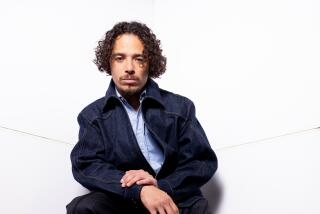Brothers in Exile
Carlos de Abreu, the founder and president of the Hollywood Film Festival, which opens Thursday, was reviewing this yearâs submissions when his attention was drawn to an Australian documentary called âThe Diplomat.â
There on the screen was exiled Portuguese freedom fighter Jose Ramos-Horta, who in 1996 was awarded the Nobel Peace Prize along with Roman Catholic Bishop Carlos Belo for their work on behalf of the oppressed people of East Timor. The tiny island and former Portuguese colony in the South Pacific had struggled for independence since being invaded and annexed in 1975 by Indonesia.
De Abreu also had been forced into exile in the mid-1970s from Mozambique, another former Portuguese colony. A onetime second lieutenant in the Portuguese air force, De Abreu had sided with the colonialists in Mozambique. âI was on the nationalist side, the Portuguese government side, the wrong side,â he recently recalled.
On Mondaynight at the Beverly Hilton, these two former exiles from different parts of the globe will embrace as De Abreu presents his festivalâs humanitarian award to Ramos-Horta for his work in East Timor. The ceremony will follow a Sunday night screening of the documentary at Paramount Studios in Hollywood.
There is more than a little irony in the presentation. De Abreu, whose family lost everything in Mozambique when a leftist government came to power, said he would have once viewed Ramos-Horta as his mortal enemy because the Nobel laureate had befriended the regime De Abreu had fled.
âHe was friends with the president of Mozambique, who was my enemy,â said De Abreu, who noted that he chose to honor Ramos-Horta for âsaving lives.â
For his part, Ramos-Horta said although he does consider the leader of Mozambique to be a friend, he took no part in the independence struggles in that African nation. His sole interest, he stressed, was East Timor. Both men note that they did not know each other during this period.
The collapse of colonialism followed a military coup in Lisbon that toppled the right-wing dictatorship in Portugal.
De Abreu said his mother and father fled Mozambique for South Africa, while he and his sister went to Lisbon. Eventually, he deserted the Portuguese air force and went to South Africa, then headed for Brazil before arriving in the U.S. in April 1977.
âIâve been an exile ever since,â De Abreu said of Mozambique. âI lost my country--everything that I loved dearly.â
The 82-minute documentary, written and directed by Tom Zubrycki, follows Ramos-Horta in the final tumultuous year of his campaign to secure independence for East Timor.
For the documentary, Ramos-Horta said he agreed to let the filmmakers accompany him because he did not want to pass up any opportunity to publicize the plight of East Timor and its people.
In a telephone interview late last week from Lisbon, Ramos-Horta said the filmmakers followed him around for two years.
âSometimes, it was very annoying,â he said. âI was rude to them. They filmed 170 hours [and used] one hour. I said, âWhat the hell do you think you are doing? You doing a Spielberg movie or what?ââ
Ramos-Horta, a former journalist, now says he regrets he didnât exert his authority more because the documentary is spiced with his salty dialogue.
âBy the time they finished the film, Timor was free and I couldnât care less about the film by then,â he said. âIt was only when I saw the film that I was embarrassed and regretted not sticking by my demand to edit out most of the swearing.â
The filmmakers couldnât have chosen a more turbulent period to follow Ramos-Horta on his globe-trotting.
Since his exile from East Timor in 1975, Ramos-Horta exchanged his gun for the suit and tie of a diplomat, spending 24 years as a roving ambassador, trying to ensure that the world did not forget East Timor.
In 1996, he and Belo were honored by the Nobel Foundation âfor their sustained and self-sacrificing contributions for a small but oppressed people.â
The documentary includes dramatic news footage, including the 1975 invasion by Indonesia, the collapse in 1998 of President Suhartoâs government, and a referendum to determine East Timorâs future that was held the following year. The vote took place in August 1999, and independence was favored by 80% of the voters.
Then all hell broke loose.
As celebrations got underway, bands of Indonesia-backed militia began roaming the streets, killing thousands, burning 85% the city of Dili and its outlying villages and forcing many to flee.
A world away, Ramos-Horta watched the carnage on CNN.
âIt was the darkest year in my entire life,â he said. âIt seemed like everything was coming down, crumbling. I knew, obviously, that sooner or later, East Timor would be free and independent, but I did not expect that the referendum in August of 1999 would result in the thorough destruction of the country, that a group of people in the Indonesian army would behave in such a way.â
A United Nations peacekeeping force eventually entered East Timor, curbing the violence and allowing citizens to return. And Ramos-Horta was able to set foot back on his countryâs soil for the first time in more than two decades. They cheered him as he stepped off the plane.
Today, there are 8,000 U.N. troops patrolling East Timor, although their mission is scheduled to end in a few months. Amnesty International has warned the U.N. not to make big cutbacks, saying that justice and human rights are still not guaranteed.
A U.N. administration known as UNTAET took over the running of the territory in early 2000, and Ramos-Horta is serving as foreign minister under the U.N. transitional administration.
âWeâve made tremendous progress in the last 20 months or so,â he said. âAll the schools have reopened .... On Aug. 30, we will have the first elections for a constitutional assembly to draft a constitution.â Independence, he noted, will occur early next year.
Ramos-Horta, meanwhile, is establishing a nonprofit fund to support the reconstruction and development of East Timor. Anyone wishing to donate can access the fund through the Internet at https://fundforeasttimor.org.
Meanwhile, Ramos-Horta said, the people of his homeland are âbusy rebuilding their lives.â
But his mother wonât be returning to the new East Timor.
âMy mother, who lives in Sydney, Australia, now, is very unforgiving,â the Nobel laureate said. âShe survived World War II under the Japanese. She lost all her family in World War II. Then in 1975, when the invasion came, she saw my brothers and sisters killed. She doesnât want to go back and see all the destruction.
âI lost three brothers and a sister,â he added. âA sister and brother, at least, we know where they were buried. Two brothers we donât know where they are buried.â
Interviews with his mother, Natalima Ramos-Horta, are sprinkled throughout the film.
Recalling the 1975 invasion by Indonesiaâs military, she says: âThe bombing was horrible. It really looked like World War II. Everybody was a target to be killed. Thatâs what the Indonesians wanted--to shoot anyone they saw before them.â
In one compelling scene, the elderly woman with world-weary eyes runs her wrinkled fingers across the black-and-white images of smiling children pasted in an old scrapbook and sadness seeps into her voice.
âThis daughter was killed in the bombing ... Mariazinha,â she says. âSad memories, very sad.â Then she points to another photo. âThis is my son, who died in the war. The three children--Rosa, Mariazinha, also dead, and Nuno ... all very young here.â
Hollywood often rallies on behalf of human rights around the world. Richard Gere and Harrison Ford, for example, are just two of the stars who have called attention to Chinaâs continuing occupation of Tibet and the forced exile of that countryâs religious leader, the Dalai Lama. Indeed, Hollywood made two movies a few years ago about the Chinese invasion of Tibet, angering the Beijing government.
But Ramos-Horta said few show business people ever expressed much interest in East Timor, where the bloodshed was overwhelming.
âA few individuals were sympathetic,â he said, âbut by and large, East Timor is not like Tibet or the Dalai Lama.â
Ramos-Horta said he may not get to Hollywood that often, but he does love the movies.
âTell Sigourney Weaver to give me a role in one of the âAlienâ movies,â he quipped. âI watch all the âAlienâ movies. I really love them.â
More to Read
Only good movies
Get the Indie Focus newsletter, Mark Olsen's weekly guide to the world of cinema.
You may occasionally receive promotional content from the Los Angeles Times.










